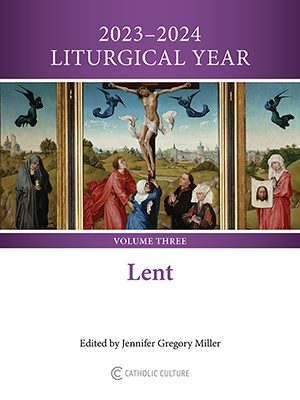Ethical guidance is key to economic health, Pope says
August 18, 2011
Free eBook:

|
| Free eBook: Liturgical Year 2023-2024, Vol. 3 |
An economic system “cannot be measured only by the highest profits, but rather according to the common good,” Pope Benedict XVI said on August 18.
In an exchange with reporters who accompanied him on his flight to Madrid for World Youth Day, the Holy Father said that ethical questions are not unrelated to economic health. Indeed, he said, they are “an interior and fundamental aspect” of judging an economic system’s health.
“The economy does not function solely by the self-regulation of the marketplace,” the Pope explained, “but needs an ethical reason to work on behalf of man.” In a healthy system, he continued—citing the teachings of his predecessor, Blessed John Paul II—the economy centers on serving man, rather than simply on maximizing profits.
When the economy is functioning well, the Pope explained, it serves the common good, providing for the people’s needs. In a global economy, he added, the system should serve not only the needs of a particular community or nation, but should work also “for the parts of the world that are suffering, for those who are hungry and those who have no future.”
Finally, the Pope said, a healthy economy should open new possibilities for future generations. If young people do not see hope for the future, the economic system is not working properly.
“It is possible” to build an economy on the proper moral foundations, the Pope insisted. “It is a great challenge,” he admitted, but “it is fundamental for our future.”
In answer to another question posed by a reporter, about the role of tolerance in a multi-cultural society, the Pope said that Christians must never try to impose their views on others. The quest for truth, he said, can never be subject to the use of force; "freedom and truth are so intimately united that the one is the condition for the other."
Human nature seeks after the truth, the Pope continued. "We do not want lies; we do not want the positivism of norms imposed by certain kinds of force." He observed that when people come to believe that there is no such thing as objective truth, they are then subject to "the arbitrariness of those who have power."
For all current news, visit our News home page.
Further information:
- Pope demands greater ethics in economic policy (AP)
- Benoît XVI commente la crise économique mondiale (Le Figaro)
All comments are moderated. To lighten our editing burden, only current donors are allowed to Sound Off. If you are a current donor, log in to see the comment form; otherwise please support our work, and Sound Off!
-
Posted by: stpetric -
Aug. 22, 2011 11:19 PM ET USA
"In a healthy system...the economy centers on serving man, rather than simply on maximizing profits." But a firm makes a profit only to the extent that it serves its customers; if they thought they'd be better served, they'd take their business elsewhere. It's only an indirect measure, but the inference is that firm that's prospering would seem to be meeting the needs of its clients.







